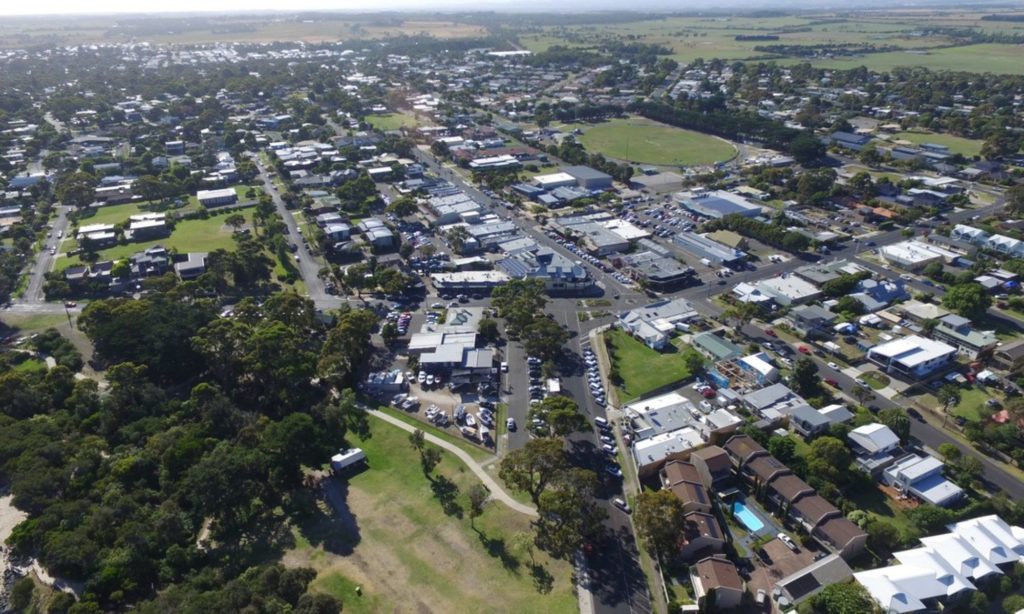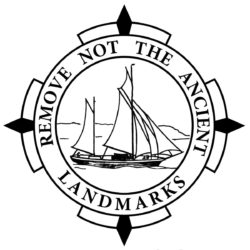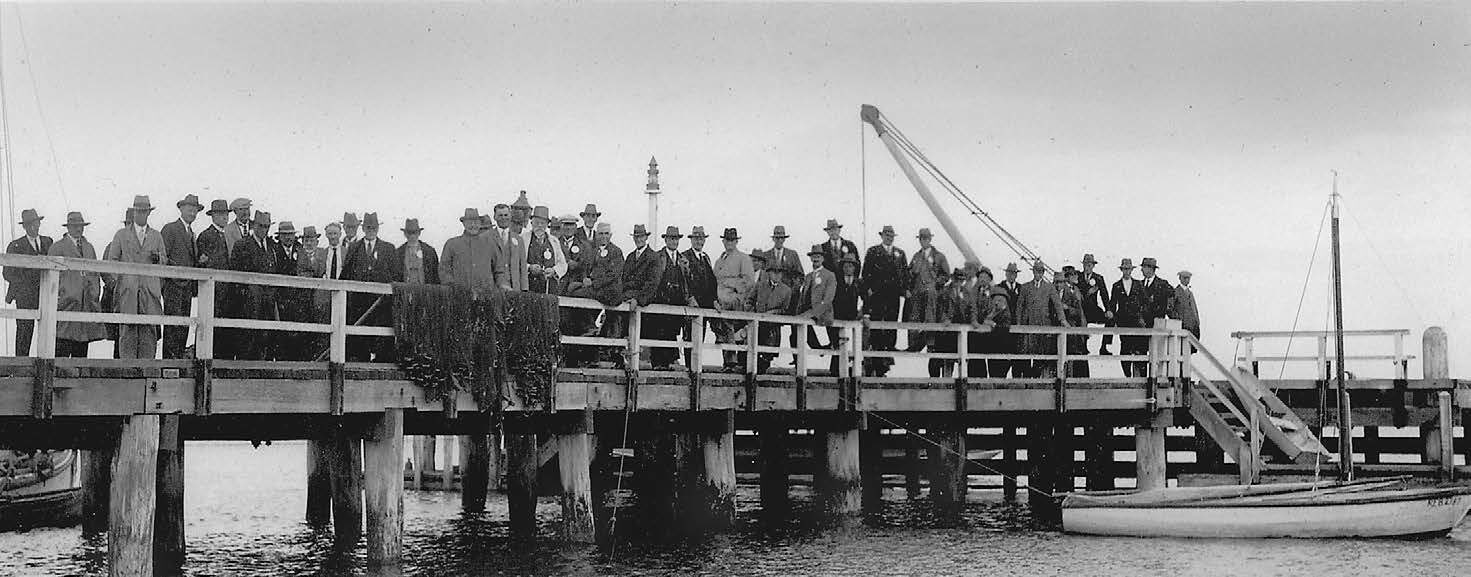Currently we live in difficult and unusual times for everybody, and that includes how the
Inverloch Historical Society functions. We are required in these exceptional circumstances to operate very differently.
CONSEQUENTLY, WE ADVISE THAT ALL MEETINGS – BE IT GENERAL OR COMMITTEE, ARE CANCELLED UNTIL FURTHER NOTICE. SHOULD MATTERS CHANGE, YOU WILL BE ADVISED BY A NEWSLETTER.
The Committee will still be operating, but in very changed ways.
Our Newsletter will continue, and you will note this edition represents both April and May. we have tried to make up for the loss of guest speakers at our General Meetings, by hopefully presenting articles of quality and interest.
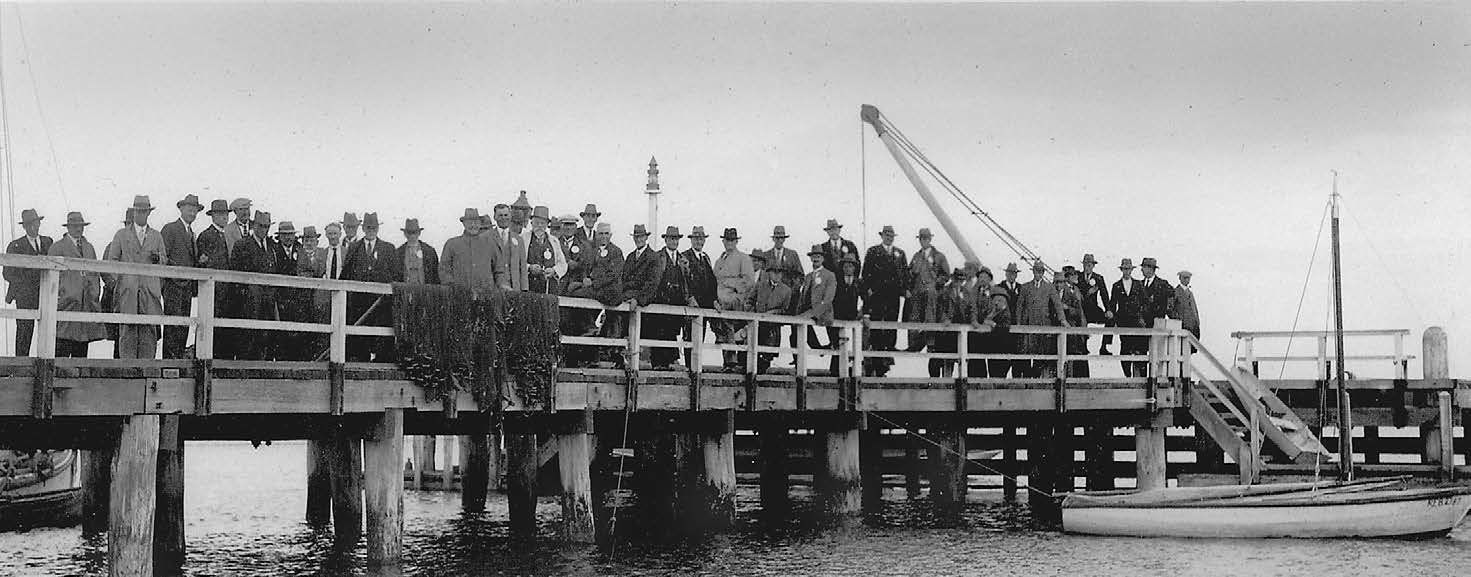
Portland’s Rocket Shed
The Rocket Shed always looms large in importance in Inverloch, and we are well aware of its size, its use and the materials it’s made of.
I thought you might like to see what Portland in Western Victoria has. Their Rocket Shed was built in 1886 by a local Portland builder George Sedgwick in bluestone, which replaced an earlier timber construction. Being one of Victoria’s earliest settlements, where many structures were in bluestone, it comes as no surprise to see the structure built of a similar material, in keeping with many local buildings. The Harbour Masters House is also of bluestone.
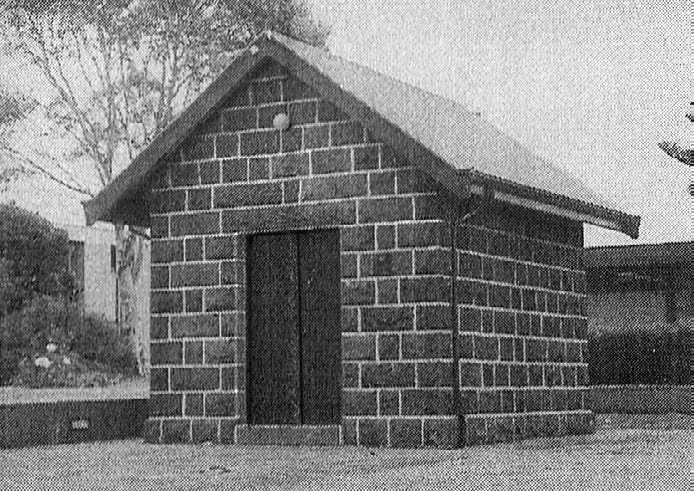
Brown’s Kiosk
This article was written by P.J.Allen, based upon a letter written by Lesley Newton (nee Brown). Brown’s kiosk was located on the corner of Ramsey Boulevard and Abbott St.
“We shifted to Inverloch, I think about 1948 – Bill and Lily Brown with daughters Elaine and myself (Lesley). We bought the kiosk from the Lookers and I do not know if they built it or bought it from somebody else. At that time ice cream came into the Wonthaggi Railway Station in big canvas shippers filled with dry ice. It was Peter’s ice cream and later on it came in a truck by road. There was no prepacked ice cream in the early days, and was sold in cones – I think threepence. A tiny baby cone was one penny.
Milk was delivered and kept in another fridge and it was ladled into jugs or ‘billys’ which people buying the milk supplied. Soft drinks came from Dawsons in Wonthaggi in glass bottles and packed into big wooden boxes with 24 to a box. Lollies all came in what was called a cash van, a big truck with the back all fitted out with shelves. The driver called out the types of lollies and you answered ‘yes’ or ‘no’. and how many boxes you wanted. The driver would then tell you what new lines he had and give you a sample to try.
Inverloch was a popular place for campers and at Christmas time it was wall to wall tents along the foreshore. Mr. Grindley used to ride his horse and collect the camping fees. There were few amenities but I don’t recall anyone getting ill from unhygienic conditions.
Mum and Dad used to do afternoon teas on the front lawn with lots of tables and chairs with big canvas beach umbrellas. Mum must have made countless sandwiches and I bet she hated it, but she was well known for them, as they were lovely. Dad would have the window open at the side of the kiosk and would have Mantovani records playing for people to enjoy listening as they ate. We would take orders for sandwiches at the counter and then Elaine and I would run up the stairs to give Mum the order and run back again when we thought they would be ready. Dad got this bright idea and bought two old telephones – one he put in the shop and the other in the house. This made a big difference to our legs being able to ring Mum and give the orders.
We had coppers out the back of the shop and a lane way that ran down beside the shop to the rear. On a Sunday there would be this queue right down the lane, with men lining up in their Sunday best – suits, hats etc….each carrying a ‘billy’ to buy boiling water for their Sunday picnic. Dad always wore a dustcoat to serve in the shop and out at the coppers. The use of the coppers seemed to fizzle out as I suppose the Thermos flask came into being. Also the afternoon teas on the lawn stopped.
In the early days one of the campers – a Frank Lee, used to show films in a great big Army tent. Then Dad enclosed in the front verandah of the house to use it as a projection box, built a screen, got hold of a projector from somewhere and would show pictures. My job was to put out all the folding chairs and clean up the lawn the next day.
I didn’t mind this job, as I would usually find a few dropped pennies, which I would promptly go round to the front of our shop and spend. I was also allowed to keep the Fantail or Milkshake lollies that had been dropped, as they were still wrapped. The films used to come from the Shell Film Company. I do not know for how long we showed the films, but as I remember it was for a long time. When the films fizzled out, Dad turned the front lawn into a mini golf course and made all the clubs. A lot of fun was had, all out of simple pleasures,
Dad was a blacksmith by trade and had served his time at the Newport Railway Workshops. Working on a drop hammer sent him deaf and he was advised to get out of engineering before he became permanently deaf, and that is how he came to buy the “Kiosk”. Dad’s union fought for him and it was the first case won for industrial deafness. He was awarded fifty pounds ($100) which enabled him to buy a hearing aid.
The “Kiosk” would not support us over the winter months so Dad got a job at Pages in Wonthaggi and used to draw up plans for their machinery. Later Dad worked for Lou Canolie engineering works in Leongatha and he stayed there for the rest of his working life.
The Inverloch foreshore was just a track in those days and I would walk to school or later ride my bike. Sometimes I would walk home along the beach wall or sometimes around The Crescent and never had to fear anything. I used to be in everybody’s tents or down on the beach swimming.
Dad was also a St. Johns Ambulance Officer and it was quite common to have someone in our lounge room with Dad working on them as they had nearly drowned. The trouble was that people would come from Melbourne and go straight into the water, not knowing about the strength of the current in the channel, and the next thing is, they are in trouble. One lass I remember was saved from drowning by her plaits drifting behind her. A human chain was formed and was just able to reach her plaits and pull her in.
I could ramble on forever. Hopefully this letter will cause a bit of interest and a few memories to surface.
LESLEY NEWTON (nee Brown)
2020 Annual General Meeting (AGM)
This would normally be held in either July or August. In the current circumstances, no
announcement will be made until we have a clearer picture of how the year and all its
difficulties is panning out.
Inverloch’s Very Own ‘Bard’
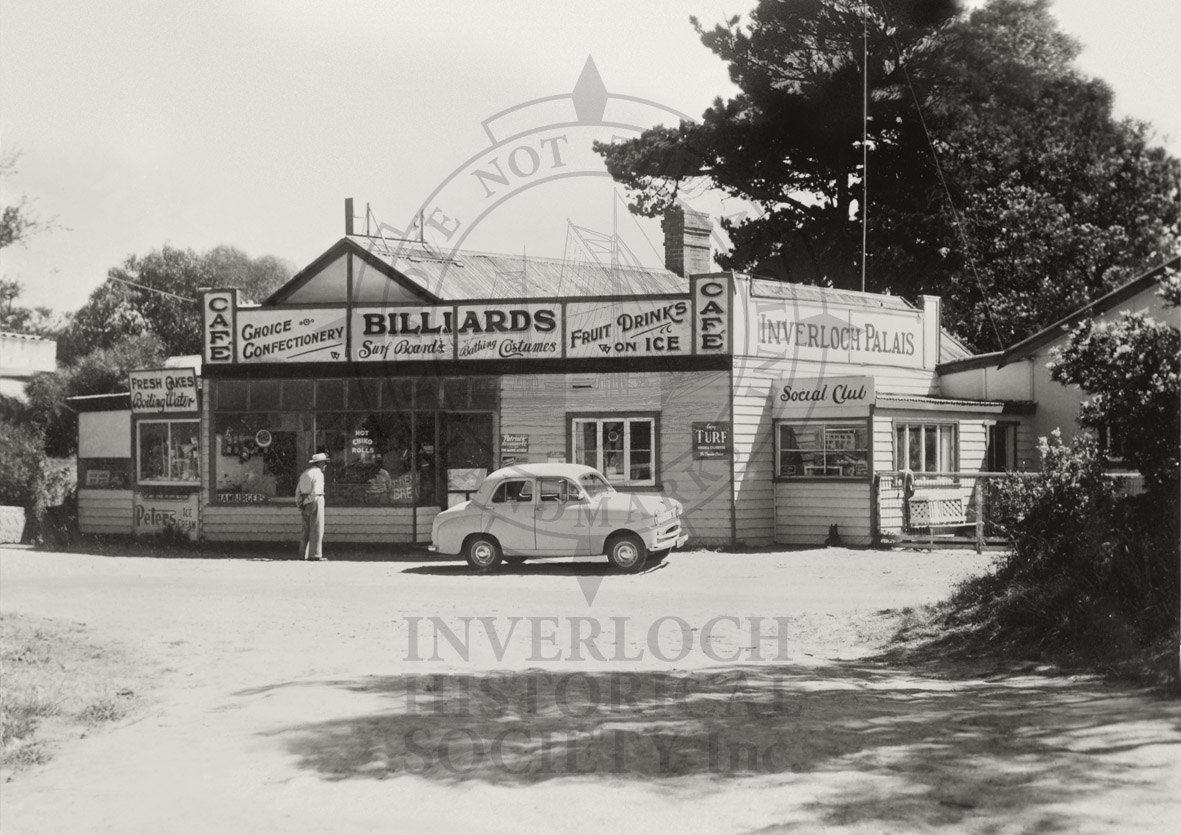
Poetry was rarely ever the most exciting part of an English class whilst at school. Our Treasurer Harry Dunn must have been an exception, for today he occasionally bursts into verse, usually about his memories of Inverloch many years ago. Now I must admit I’ve tried writing poems, but my efforts were lousy, to put it simply. However, Harry’s efforts are far more fruitful and interesting, and I thought members might like to hear a few verses about an Inverloch institution – Myrtle Nelson’s “Dance Palais”, which resided just down from the Inlet Hotel. Here’s what Harry had to say.
Myrtle Nelson’s “Dance Palais”
A poem by Harry Dunn (Inverloch History’s Treasurer)
Yes, Inverloch-on-sea had its very own Palais,
Nelson’s – by ownership and name,
Impressive architecture and expensive objects d’art
Were not this Palais’s claim to class & fame,
In fact, Nelson’s Palais, Caff and Tarax Bar
Was rather down at heel, as its wonky floors attested,
Where here & there the rotting stumps had waved the place ‘au’voir’
And departed from the scene,
So the bearers had long rested,
On sandy terra firma – with nothing in between.
The maitre d’ was Arthur Nelson, known to all as Sammy,
And the lady of the house was Mrs. Nelson – Myrtle,
Sammy’s darling wife, a hard working and good natured soul,
Whose name was often rhymed unkindly with the Turtle;
But, tho’ Myrtle’s outer shell was hard,
The heart that beat within was solid gold.
Nelson’s Palais during summer was a bustling seaside shop,
Selling tucker to the terrorists, the foreshore campers,
The day trippers, the beach strippers. and all who chose to stop
Ice Creams, Tarax, post cards, smokes and Ayrton toffee,
They offered pots of tea and scones with jam on top.
Although I don’t remember any coffee:
But this was the Nineteen Fifties, don’t forget
Long before the coffee drinking craze And the coffee-culture set.
But winter down in Inverloch – and it seemed to last forever,
Was off-season for the Nelsons and other local shops,
Selling ice cream, food to go, cold drinks, whatever,
Except for David Beaton’s Esplanade Hotel, Which never lacked for custom,
Regardless of the weather,
Introducing many local lads to that hand cart
bound for Hell
But that’s another story altogether.
They were decent folks, those Nelsons,
And made us feel at home,
But woe betide the lad who swore an oath
Within Mrs. Nelson’s hearing,
Or was heard reciting – the latest smutty pome,
The rules were strict and mostly well observed
For well we knew that he who misbehaved,
Wouldn’t soon be reappearing.
Nelson’s Palais’s now long gone,
As are Sammy and his spouse,
And most of us young lads who played a game of pool,
In that crumbling old hash house
Located on the Esplanade, which we thought was rather cool,
But young and thoughtless tho’ we were,
We held both Sam and Mrs. N in high regard,
Even when we played the fool.
We’re all in Detention!
Now that’s a word that without any doubt brings memories of schooldays to your attention – detention!
For those of you with legalistic minds, there is such a thing even today as a penalty of home detention. Sometimes on the ‘telly’, the judge will announce that the punishment is six months “Home Detention” as punishment for the offence committed.
But aren’t we all now serving (and for logical and sound reasoning), such a sentence in these Corona 19 times. It may give us all a small window of light into the experience of a judge in a legal court announcing such a sentence. Maybe this is the glorious opportunity for all members of our Society to begin writing their ‘memoirs’ or their ‘life story’. Just a thought – but a worthy one!
The 1952 ‘Mr. Inverloch’ Competition
For many years Inverloch’s famous Miss Inverloch competition was held, usually around New Years Day. The thousands of holiday makers that came to Inverloch, usually camping along the Foreshore in an almost unregulated fashion, with camping THE 1952 ‘MR. INVERLOCH COMPETITION. fees most earnestly collected by either Mr. Grindly or Mr. Ramsey, were full of expectation, knowing the main attraction on New Years Day was the Miss and Mr. Inverloch beauty competitions. Literally thousands of people came, even if just for the day – as many from Wonthaggi will remember.
The ‘competition’ was always enjoyed by the competitors and spectators alike, for it was all in the spirit of good fun and of raising funds for improvements to the Foreshore and the Wonthaggi hospital.
What made the 1952 “Mr.” competition special in the history of Inverloch, was that the eventual winner was Mr. Football himself – Ted Whitten, the Footscray champion, who, in 1954, formed part of the ‘Bulldogs’ very first VFL League title. What’s more, in 1952 he was a young, enthusiastic and slightly cheeky Ted Whitten. He made quite a hit with the young ladies! The photo of him wearing his winners sash should be carefully examined. With careful inspection you will note, to the annoyance of all Locals, English teachers and laughing Footscray supporters, the spelling of INVERLOCH somehow became INVERLOCK.
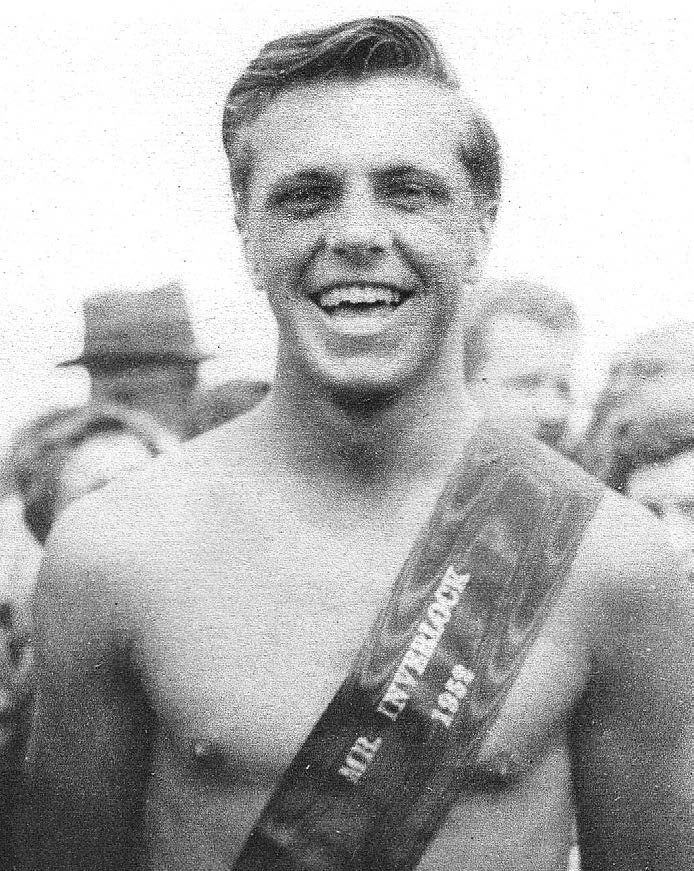
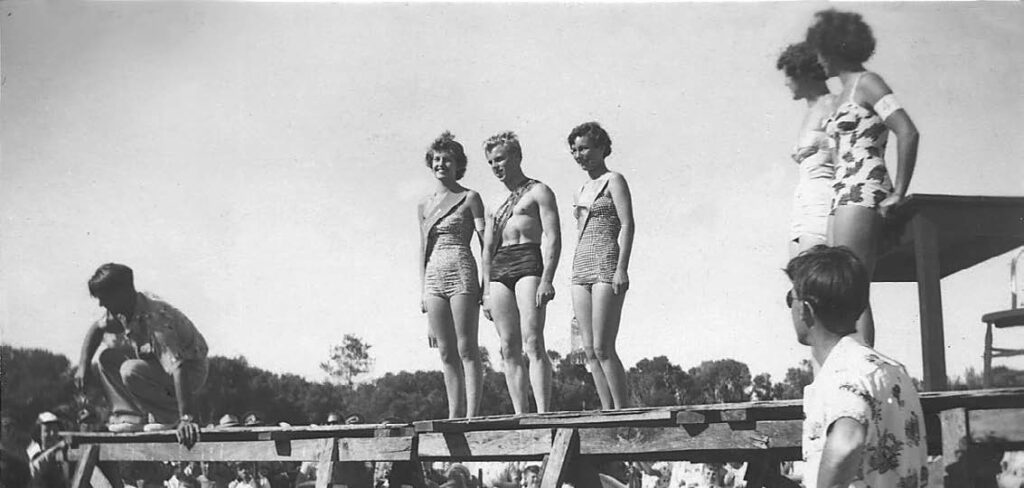
John Hutchinson (President)
